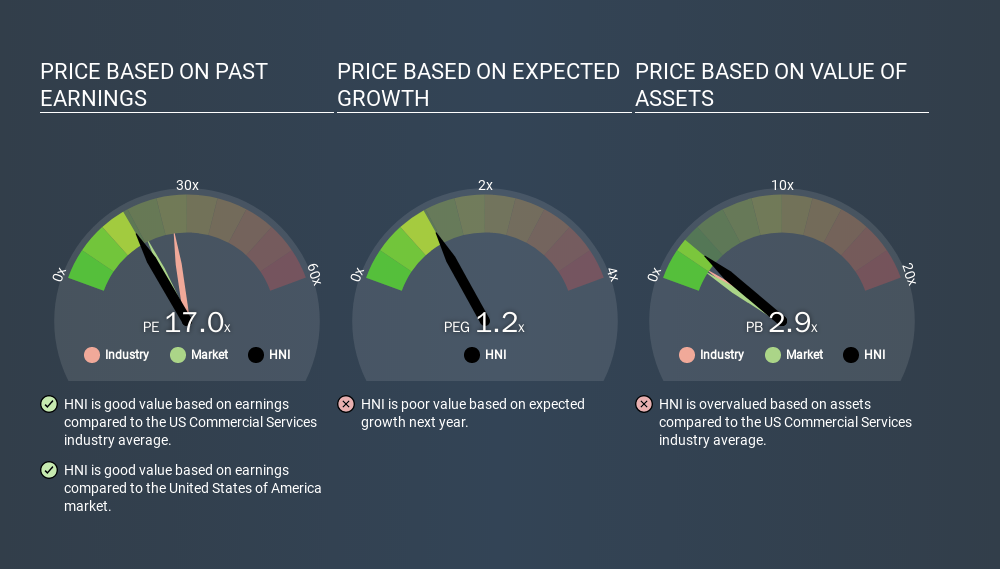- United States
- /
- Commercial Services
- /
- NYSE:HNI
Here's What HNI Corporation's (NYSE:HNI) P/E Ratio Is Telling Us

The goal of this article is to teach you how to use price to earnings ratios (P/E ratios). We'll apply a basic P/E ratio analysis to HNI Corporation's (NYSE:HNI), to help you decide if the stock is worth further research. HNI has a P/E ratio of 17.04, based on the last twelve months. That means that at current prices, buyers pay $17.04 for every $1 in trailing yearly profits.
Check out our latest analysis for HNI
How Do You Calculate A P/E Ratio?
The formula for price to earnings is:
Price to Earnings Ratio = Share Price ÷ Earnings per Share (EPS)
Or for HNI:
P/E of 17.04 = $37.46 ÷ $2.20 (Based on the year to September 2019.)
Is A High P/E Ratio Good?
The higher the P/E ratio, the higher the price tag of a business, relative to its trailing earnings. That isn't necessarily good or bad, but a high P/E implies relatively high expectations of what a company can achieve in the future.
Does HNI Have A Relatively High Or Low P/E For Its Industry?
The P/E ratio indicates whether the market has higher or lower expectations of a company. We can see in the image below that the average P/E (26.4) for companies in the commercial services industry is higher than HNI's P/E.

Its relatively low P/E ratio indicates that HNI shareholders think it will struggle to do as well as other companies in its industry classification. Since the market seems unimpressed with HNI, it's quite possible it could surprise on the upside. It is arguably worth checking if insiders are buying shares, because that might imply they believe the stock is undervalued.
How Growth Rates Impact P/E Ratios
If earnings fall then in the future the 'E' will be lower. That means unless the share price falls, the P/E will increase in a few years. So while a stock may look cheap based on past earnings, it could be expensive based on future earnings.
HNI had pretty flat EPS growth in the last year. But over the longer term (5 years) earnings per share have increased by 5.1%. And over the longer term (3 years) earnings per share have decreased 3.0% annually. So you wouldn't expect a very high P/E.
Don't Forget: The P/E Does Not Account For Debt or Bank Deposits
The 'Price' in P/E reflects the market capitalization of the company. In other words, it does not consider any debt or cash that the company may have on the balance sheet. The exact same company would hypothetically deserve a higher P/E ratio if it had a strong balance sheet, than if it had a weak one with lots of debt, because a cashed up company can spend on growth.
Such spending might be good or bad, overall, but the key point here is that you need to look at debt to understand the P/E ratio in context.
HNI's Balance Sheet
HNI has net debt worth 12% of its market capitalization. It would probably deserve a higher P/E ratio if it was net cash, since it would have more options for growth.
The Verdict On HNI's P/E Ratio
HNI's P/E is 17.0 which is below average (18.9) in the US market. The company hasn't stretched its balance sheet, and earnings are improving. If growth is sustainable over the long term, then the current P/E ratio may be a sign of good value.
Investors have an opportunity when market expectations about a stock are wrong. If it is underestimating a company, investors can make money by buying and holding the shares until the market corrects itself. So this free visual report on analyst forecasts could hold the key to an excellent investment decision.
You might be able to find a better buy than HNI. If you want a selection of possible winners, check out this free list of interesting companies that trade on a P/E below 20 (but have proven they can grow earnings).
If you spot an error that warrants correction, please contact the editor at editorial-team@simplywallst.com. This article by Simply Wall St is general in nature. It does not constitute a recommendation to buy or sell any stock, and does not take account of your objectives, or your financial situation. Simply Wall St has no position in the stocks mentioned.
We aim to bring you long-term focused research analysis driven by fundamental data. Note that our analysis may not factor in the latest price-sensitive company announcements or qualitative material. Thank you for reading.
About NYSE:HNI
HNI
Engages in the manufacture, sale, and marketing of workplace furnishings and residential building products primarily in the United States and Canada.
Very undervalued with solid track record and pays a dividend.
Similar Companies
Market Insights
Community Narratives


